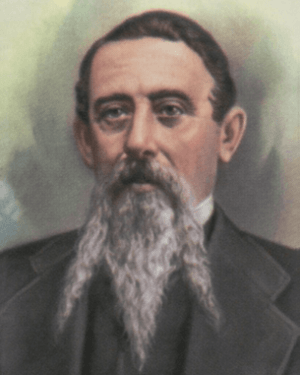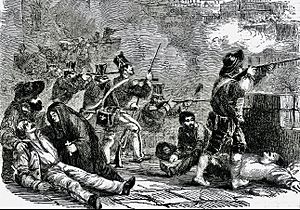Martín Carrera facts for kids
Quick facts for kids
Martín Carrera
|
|
|---|---|
 |
|
| 22nd President of Mexico | |
|
Acting
|
|
| In office 5 August 1855 – 12 September 1855 |
|
| Preceded by | Antonio López de Santa Anna |
| Succeeded by | Rómulo Díaz de la Vega |
| Personal details | |
| Born | 20 December 1806 Puebla, Puebla, New Spain |
| Died | 22 April 1871 (aged 64) Mexico City, Mexico |
| Nationality | Mexican |
| Political party | Liberal |
| Spouse | María de los Angeles Lardizábal |
Martín Carrera Sabat (born December 20, 1806 – died April 22, 1871) was an important Mexican general and politician. He even served as the temporary president of Mexico for about a month in 1855. He was known as a moderate Liberal.
Carrera was a soldier from a young age. He spent his whole life involved in Mexico's military. Later, he also took on political roles. He served in the Mexican congress and was part of the council of state many times.
His time as president happened when a plan called the Plan of Ayutla was succeeding. This plan aimed to overthrow the government of Antonio López de Santa Anna. When Santa Anna left the capital city, a group of leaders chose Carrera as president. He tried to find a middle ground between the old government and the new revolution. However, the revolutionary leaders did not fully trust him. Because he couldn't get support from all parts of the country, Carrera resigned after only about a month.
Contents
Early Life and Military Beginnings
Martín Carrera was born in Puebla, Mexico, in 1806. His family was well-known, and his father was an artillery colonel. When Martín was just nine years old, he joined the army. This was during the Mexican War of Independence. By the age of twelve, he became an officer. Even though he was very young, he was put in charge of training soldiers.
Serving Independent Mexico
In 1821, Carrera joined Agustín de Iturbide's Plan of Iguala. This plan helped Mexico gain its independence. The next year, he worked with the artillery to defend Veracruz. This city was still threatened by Spanish forces. Carrera was responsible for the city's defenses and cannons. He even defended Veracruz when Iturbide's troops attacked it. Soon after, he was promoted to colonel.
By 1823, he was a captain in charge of making weapons in the capital. In 1828, he defended the government during a revolt. After the revolt, he was promoted to lieutenant colonel.
In 1831, he was put in charge of the Ciudadela, a fortress in Mexico City. He became a brigadier general in 1841. Carrera also served in the national legislature in 1842. He was a senator in 1844 and 1845. He also advised the Ministry of War.
Carrera fought in the Mexican-American War. He was present when Mexico City fell to American forces. In 1853, he supported the plan that brought Santa Anna back to power. Santa Anna made him a division general and head of troops in Mexico City. Carrera also helped Santa Anna try to stop revolts in Michoacán.
Presidency of Mexico
After failing to stop the Plan of Ayutla, Santa Anna decided to resign. He fled the country on August 9. Santa Anna had left an order for power to go to three people: the head of the Supreme Court, Mariano Salas, and Martín Carrera. They were supposed to call a meeting to write a new constitution.
However, General Carrera and General Romulo Diaz de la Vega, who led the army in Mexico City, did not follow Santa Anna's plan. Instead, on August 13, they announced their support for the Plan of Ayutla.
The leaders in the capital chose Romulo Diaz de la Vega to pick a group of representatives. This group would then elect a new president. Martín Carrera was chosen as the new president.
As president, Carrera tried to remove the last parts of Santa Anna's harsh rule. He stopped military leaders from controlling money matters. He also announced plans to organize the national guard and improve the army. He wanted to fix the country's money problems and protect people's rights.
Carrera's government also faced another uprising. This was led by Antonio Haro y Tamariz. He wanted Santa Anna removed, no forced military service, and freedom of the press. This revolt started before people knew Santa Anna had already left. The leaders of the Ayutla movement tried to work with Haro y Tamariz.
The Plan of Ayutla was a liberal movement. Carrera's government was seen by some as an attempt to control the revolution. He had limited support across the country. Ignacio Comonfort, a main leader of the Ayutla movement, refused to recognize Carrera as president. Carrera invited revolutionary leaders to a meeting on September 16, but they refused.
Carrera was losing the support of the nation. Revolutionary troops were getting closer to the capital. Faced with this, Carrera resigned on September 11. He left the command of Mexico City to Romulo Diaz de La Vega. Diaz de La Vega then chose a council of seven members. The army declared that they had only recognized Carrera for a short time. They now fully supported the Plan of Ayutla. Carrera hoped his countrymen would see that he had kept his promise of not causing any harm.
Later Life
After leaving the presidency, Carrera lived a private life. He offered to help the government in 1862 during a foreign invasion, but his offer was not accepted. He officially retired from the military during the Second Mexican Empire. Martín Carrera passed away on April 22, 1871.
See also
 In Spanish: Martín Carrera para niños
In Spanish: Martín Carrera para niños
Images for kids
 | Misty Copeland |
 | Raven Wilkinson |
 | Debra Austin |
 | Aesha Ash |




